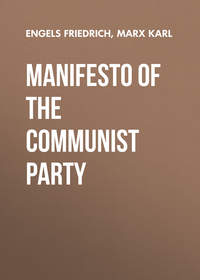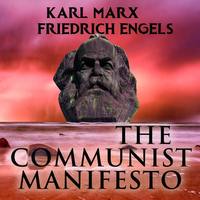 полная версия
полная версияLandmarks of Scientific Socialism: "Anti-Duehring"
Just as far as society obtains the domination of the social means of production in order to organize them socially it abolishes the existing servitude of man to his own means of production. Society cannot be free without every member of society being free. The old methods of production must be completely revolutionized and the old form of the division of labor must be done away with above all. In its place an organization of production will have to be made in which, on the one hand, no single individual will be able to shift his share in productive labor, in providing the essentials of human existence, upon another, and on the other hand productive labor instead of being a means of slavery will be a means towards human freedom, in that it offers an opportunity to everyone to develop his full powers, physical and intellectual, in every direction and to exercise them so that it makes a pleasure out of a burden.
This is no longer at the present time a phantasy, a pious wish. Owing to the present development of the powers of production, production has proceeded far enough, provided that society endows itself with the possession of the social forces and abolishes the checks and impediments, as well as the waste of products and productive forces, which springs from the capitalistic methods, to make a general reduction of labor time, to an amount, small as compared with present day ideas.
The abolition of the old method of division of labor is not an advance which would not be possible except at the expense of the productivity of labor, quite otherwise. It is a condition of production which has come about spontaneously through the great industry. "The machine industry does away with the necessity of constantly distributing groups of workmen at the different machines by keeping the worker constantly at the same task. Since the total product of the factory, proceeds not from the worker but from the machine, a continual changing about of individuals could not exist, without an interruption of the labor-process. Finally the speed with which work at the machine is learnt even by children does away with the necessity of training a distinct class of workmen exclusively as machine laborers." But while the capitalistic method of use of machinery does away with the old limited particularity of labor, and, in spite of the fact, that technique is rendered superfluous, machinery itself rebels against the anachronism. The technical basis of the greater industry is revolutionary. "Through machinery, chemical processes and other methods, the functions of the working class and the social labor process are revolutionized along with the technical basis of production. The division of labor is also revolutionized and masses of capital and labor are hurled incontinently from one branch of industry to another. The nature of the greater industry demands mobility of labor, a fluidity of functions and a complete adaptibility on the part of the laborers. We have seen how this absolute contradiction shows itself in the continual sacrifice of the working class, the most complete waste of labor force, and the dominance of social anarchy. But if the mobility of labor now appears to be a law of nature beyond human control which realizes itself, in spite of all obstacles, it also becomes a matter of life and death for the greater industry, owing to its catastrophic character, to recognise the mobility of labor and hence the greatest possible adaptibility of the working class, as a universal law of social production, and to accommodate circumstances to its normal development. It becomes a question of life and death for the greater industry to keep an enormous number of people on the edge of starvation always in reserve, in order that they may be able to be placed at the disposal of the needs of capital as these vary."
While the greater industry has taught us how to transform molecular movement into mass movement in order to fulfill technical needs, it has, in the same measure, freed industrial production from local limits. Water power was local, steam power is free. If water power belongs to the country, steam power is by no means limited to the town. It is capitalistic practice which causes concentration into cities and which makes manufacturing towns of manufacturing villages. But thereby at the same time it undermines the essentials of its own motive force. The first requisite of the steam engine and a prime requisite of all branches of motive power is a sufficient quantity of pure water. The factory town transforms all water into evil smelling sewage. Therefore, in proportion as the concentration into cities is the foundation of capitalistic production, each individual capitalist tries to get away from the towns which have been necessarily produced to the motive forces of the country. This process may be individually observed in the textile districts of Lancashire and Yorkshire. The greater industry creates new towns in the course of its progress from the town to the country. The same phenomenon was to be observed in the districts of the metal industry where somewhat different causes produce identical results.
The capitalistic character of the greater industry is responsible for this aimless blundering and these new contradictions. Only a society which organizes its industrial forces according to a single great harmonious plan, can permit industry to settle itself in such a manner throughout the land as to secure its own development and the retention and development of the most important elements of production.
The abolition of the antagonism between town and country is now not only possible, it has become an absolute necessity for industrial production itself. It has also become a necessity for agricultural production, and is, above all, essential to the maintenance of the public health. Only through the amalgamation of city and country can the present poisoning of air, water, and localities, be put at an end and the waste filth of the cities be used for the cultivation of vegetation rather than the spreading of disease.
The capitalistic industry has made itself relatively independent of local limitations for its raw materials. The textile industry works with imported raw materials for the most part. Spanish iron ores are worked up in England and Germany, and South American copper ores in England. Every coal field supplies a yearly increasing number of places beyond its own confines. The whole coast of Europe has steam engines driven by English and, occasionally German and Belgian, coal. A society freed from the limits of capitalistic production could make still further advances. While it makes a sort of all round skilled producers, who are acquainted with the scientific requirements of general industrial production, and by whom every new succession of branches of production is completely developed from beginning to end, it creates a new productive force which undertakes the transportation of a superabundance of raw material or fuel.
The abolition of the separation between town and country is no Utopia, it is an essential condition of the proportionate distribution of the greater industry throughout the country. Civilization has left us a number of large cities, as an inheritance, which it will take much time and trouble to abolish. But they must and will be done away with, however much time and trouble it may take. Whatever fate may be in store for the German nation, Bismarck may have the proud consciousness that his dearest wish, the downfall of the great city, will be fulfilled.
It is easy to see that the revolutionary elements which will abolish the old division of labor together with the separation of town and country and will revolutionize production as a whole are already in embryo in the methods of production of the modern great industry and their unfolding is only hindered by the capitalistic methods of production of to-day. But to see all this, it is necessary to have a broader outlook than the mere limitations of the Prussian Code, the country where schnapps and beet sugar are the staple industries, and you have to study industrial crises by way of the book-trade. (This is a sneer at one of Duehring's illustrations: Ed.) One has to understand the history and the present manifestations of the greater industry particularly in that land where it has its home and where it has had its classic development. It must not be imagined that modern scientific socialism can be done away with by the specific Prussian Socialism of Herr Duehring.
DistributionWe have seen that Duehring's economics depend upon the statement that the capitalistic method of production is good enough and can be kept up, but that the capitalistic method of distribution is bad and must be done away with. We now discover that the "sociality" of Herr Duehring is merely the imaginary putting into force of this statement. In fact it appears that Herr Duehring has nothing to declare respecting the method of production as such in a capitalistic society, and that he will maintain the old division of labor in all its essential features. So he has hardly a word to say about production in his social state. Production is too dangerous a ground for him to tread on. On the other hand, in his estimation, distribution is not bound up with production but can be settled by an act of the will.
Let us consider all the ideas of Herr Duehring as realized. Let us then assume that the society pays each of its members for his work a sum in gold in which are incorporated six hours of labor, say twelve marks. Let us now imagine that prices and values are in full accord, so that under our hypothesis only the cost of raw materials, the wear and tear of machinery, the use of tools and wages are comprehended. A society then of a hundred working members produces daily goods of the value of 1200 marks, and in a year of three hundred working days three hundred and sixty thousand marks and expends the entire amount on its working members and thus each member has his share of three thousand six hundred marks a year. At the end of the year and at the end of a hundred years the society is no better off than it was at the beginning. Accumulation is entirely overlooked. Worse than that, since accumulation is a social necessity and the hoarding of gold is an elementary form of accumulation, the organization of a society on this basis will necessitate private accumulation on the part of its members and consequently the destruction of the society.
How can this difficulty with respect to the economic society be overcome? Refuge might be taken in a forcible raising of proceeds and the produce of the society sold at four hundred and eighty thousand marks instead of for three hundred and sixty thousand. But all other economic societies would be in the same fix and each would have to make it out of the other with the result that they would only be extorting tribute from their own members.
Or it might find an easy way out by paying for six hours work less than the product of six hours work, eight marks a day instead of twelve, prices remaining the same. It accomplishes in this way plainly and openly what formerly it did secretly, it adopts the Marx surplus value notion to the amount of one hundred and twenty thousand marks a year, since it pays the members under the value of their work and reckons the goods which they are only able to buy by its means at their full value. His economic society therefore can only get a reserve fund by adopting the truck system. Therefore one of two things is certain, either the economic society practices "equal work for equal work" and then it can get no funds for the maintenance and development of industry except through private sources, or it does create such a fund and ceases to practice "equal work for equal work."
This is the fact about the exchange in the economic society, but what about the form of it? According to Herr Duehring in his economic society money does not function as money between the members of the society. It serves merely as a labor certificate; it corresponds with the expression of Marx "only the share of the individual of the common labor, and his individual claim to the consumption of a certain portion of the common product" and in this function, says Herr Duehring, it is just as little money as a theater ticket. In short it functions in exchange like Owens "labor-time money." As far as the mere calculating between amount due for production and the amount to be expended in consumption of the individual member of the society is concerned, paper markers or gold would serve the purpose equally well. But it would not do for other purposes as will appear.
If the specie does not function as money among the members of a given society, but as a mark of labor, it functions still less as money in the exchange between different economic societies. According to the theory of Herr Duehring, therefore, specie as money is entirely superfluous. In fact it would be mere bookkeeping to set off the products of equal labor against the products of equal labor, according to the natural measure of labor-time, taking the labor-hour as a unit – if the labor hours are first translated into terms of money. Exchange is in reality only simple exchange; all surpluses are easily and simply equalized by means of bills of exchange on other societies. But when one community has a deficit in its dealings with another community it can only make it up by increasing its labor output, if it is not to suffer disgrace in the eyes of other communities. The reader will notice here that this is no attempt at social reconstruction. We are simply taking the notions of Herr Duehring and showing their unavoidable conclusions.
Therefore neither in exchange among the individual members of a society nor in exchange between different economic societies can gold realize itself as money. Yet Herr Duehring says that the function of money is carried out even in his "sociality." We must therefore discover another field of activity for this money function. Herr Duehring predicates a quantitatively equal consumption. But he cannot compel that. On the other hand, he prides himself that in his community one can do with his money as he will. He cannot prevent one man, therefore, from saving money and another from not making his wages sufficient. This is indisputable, for he recognises the common property of the family in inheritance and talks about the duty of parents to provide for their children. Thereby his quantitatively equal consumption comes a cropper. The young unmarried man can get along splendidly on twelve marks a day, but the widower with eight young children has a hard time of it. On the other hand the community, since it takes money in payment without ceremony, lets money be acquired otherwise than by individual labor when the opportunity offers. Non olet. It does not know whence it comes. But now arises the chance for money which has up to now played the role of a standard of work performed to operate as real money. The opportunities and the motives arise for saving money on the one hand and squandering it on the other. The needy borrows from the saver. The borrowed money taken by the community in payment for means of living becomes again, what it is in present day society, the social incarnation of human labor, the real measure of labor, the universal means of circulation. All the laws in the world are powerless against it, just as powerless as they are against the multiplication table or the chemical composition of water. And the saver of money is in a position to demand interest so that specie functioning as money again becomes a breeder of interest.
So far as we have only dealt with the operation of specie inside of Herr Duehring's economic society. But beyond the confines of that society the world goes peacefully along its old way. Gold and silver remain in the world-market, as world money, as the universal means of purchase and payment, as the absolute social incorporation of wealth. And in this ownership of the precious metals the individual societies find a new motive for saving, for getting rich, for increasing their supply, – the motive of becoming free and independent of the communities beyond their borders and of converting into money their piled up wealth in the world market. The profit hunters transform themselves into traders in the means of circulation, into bankers, into controllers of the means of production, though these may remain forever as the property of the economic and trading communities in name. Therewith the savers and profit mongers who have been converted into bankers become the lords of the economic and trading communes. The "sociality" of Herr Duehring is very distinct from the "cloudy ideas" of the earlier socialists. It has no other end than the resurrection of the high finance.
The only value with which political economy is acquainted is the value of commodities. What are commodities? Products produced in a society composed of more or less separated private producers and therefore private products. But these private products first become commodities when they are made not for private use but for the use of someone else, that is for social use. They are converted into objects of social use by means of exchange. The private producers are therefore in a social relationship, they constitute a society. Their private products, while the private products of each individual, are at the same time, unconsciously and indeed involuntarily, social products also. Wherein does the social character of these private products consist? Plainly in two properties, in the first place because they satisfy human needs but have no use-value for the producers, and in the second place that, while they are the products of individual private producers, they are at the same time plainly the products of human labor, of human labor in general. In so far as they have a use-value for other people they can be exchanged; in so far as they all possess the common quality of human labor in general, they can be mutually compared in exchange by means of this labor. In two similar products under identical social conditions there may be unequal amounts of private labor, but equal amounts of human labor in general. An unskillful smith might take as long to make five horseshoes as it would take a skillful smith to make ten. But society does not fix the price according to accidental lack of skill of the one, it recognises only human labor in general, the human labor of the ordinary normal skilled smith. Each of the five horseshoes then made by the first does not have any more value than each of the other ten which were made in the same time as the five. Only so far as is socially necessary does private labor comprehend human labor in general.
Therefore I maintain that a commodity has a certain value, 1st. because it is a socially useful product, 2nd. because it is produced by a private individual for private profit, 3d. because while it is a product of private labor, it is, at the same time, unconsciously and involuntarily a social product and exchanges socially according to a definite social standard, 4th. this standard is not expressed in terms of labor, in so many hours, but in another commodity. If, therefore, I say that this clock is worth this piece of cloth and that they are both worth fifty marks, I say that in the clock, the cloth and the gold there is an equal amount of social labor. I also affirm that the amounts of social labor time in them are socially measured and found to be equal, not directly and absolutely however, as one measures labor time in hours or days, but in a round about fashion, relatively, by means of exchange. I cannot therefore express this certain amount of labor-time in labor hours, since their number is not known to me, but I can express it relatively in terms of another commodity, which has the same amount of labor time incorporated in it. The clock is worth as much as the piece of cloth.
But while the production of commodities and the exchange of commodities compel the society resting upon them to take this roundabout course, they are impelled to a shortening of the process. They separate from the mass of commodities one sovereign commodity, in which the value of all other commodities can be universally expressed, a commodity which is the complete incarnation of social labor, and, against which, all other commodities may be set in direct comparison – gold. Gold already germinates in the idea of value, it is only developed value. But since the commodity value exists in gold also, itself being a commodity, a new factor arises in the society which produces and exchanges commodities, a factor with new social functions and operations. We can now examine this a little more closely.
The economy of the production of commodities is by no means the only science which has to reckon with relatively known factors. Even in physics, we do not know how many single gas molecules there are in a given volume of gas, pressure and temperature being given. But we know, as far as Boyle's law is correct, that a given volume of that gas has as many molecules as a similar volume of another selected gas at the same pressure and the same temperature. We can therefore compare the different volumes of different gases with respect to their molecular content, and, if we take one litre of gas at 0° Fahrenheit as the unit we can refer the molecular content of each to this standard. In chemistry the absolute atomic weights of separate elements is unknown to us. But we know them relatively when we know their mutual conditions. And just as the production of commodities and their economy has a relative expression for the unknown quantities of labor existing in commodities, since it compares these commodities according to the relative amounts of labor which they contain, so chemistry makes a relative expression for the amounts of atomic weights unknown to it, since it compares the separate elements according to their atomic weights and expresses the weight of the one as multiples or factors of the other. And just as the production of commodities elevates gold to the position of an absolute commodity, to the universal equivalent for other commodities, the measure of values, so chemistry elevates hydrogen to the position of a chemical gold-commodity, since it fixes the atomic weight of hydrogen at 1 and reduces the atomic weights of all the other elements in terms of hydrogen and expresses them as multiples of its atomic weight.
The production of commodities is by no means the exclusive form of social production. In the ancient Indian communities and the family communities of the Southern Slavs products were not transformed into commodities. The members of the community were directly engaged in social production, the work was distributed as custom and circumstances required as were the products as they came into the realm of consumption. Direct social production and direct social consumption exclude all exchange of commodities and hence the transformation of products into commodities (at least within the confines of the society) and therewith their transformation into value.
As soon as society comes into direct possession of the means of production and undertakes production as a society, the labor of each, however distinctive its special useful character may be, becomes direct social labor. The amount of social labor existing in a product does not then have to be established in a roundabout way, daily experience shows the average amount of human labor necessary. Society can easily determine how many hours of labor there are in a steam engine, how many in a hectolitre of wheat of last harvest, how many in a hundred square yards of cloth of a given quality. It cannot therefore happen that the quantities of labor embodied in commodities, which will then be absolutely and directly known, will be expressed in terms of a measure which is only relative, fluctuating, inadequate and absolute, in a third product, and not in their natural, adequate and absolute measure, time. This would not happen any more than in chemistry. One would express the atomic weights indirectly by means of hydrogen if it were possible to express them absolutely in their adequate measure, that is in real weight, that is in billions or quadrillions of grammes. Under the foregoing conditions, then, society ascribes no value to products. The simple fact that a hundred yards of cloth have taken a thousand hours in their production need not be expressed in any distorted or foolish fashion, they would be worth a thousand labor hours. Society would then know how much labor each object of use required for its creation. It would have to direct the plan of production in accordance with the means of production to which labor-force also belongs. The advantageous effects of the different objects of use and their relations to each other and the creation of the necessary means of labor would be the sole determinants of the plan of production. People make things very easily without any interference on the part of the much discussed "value."






